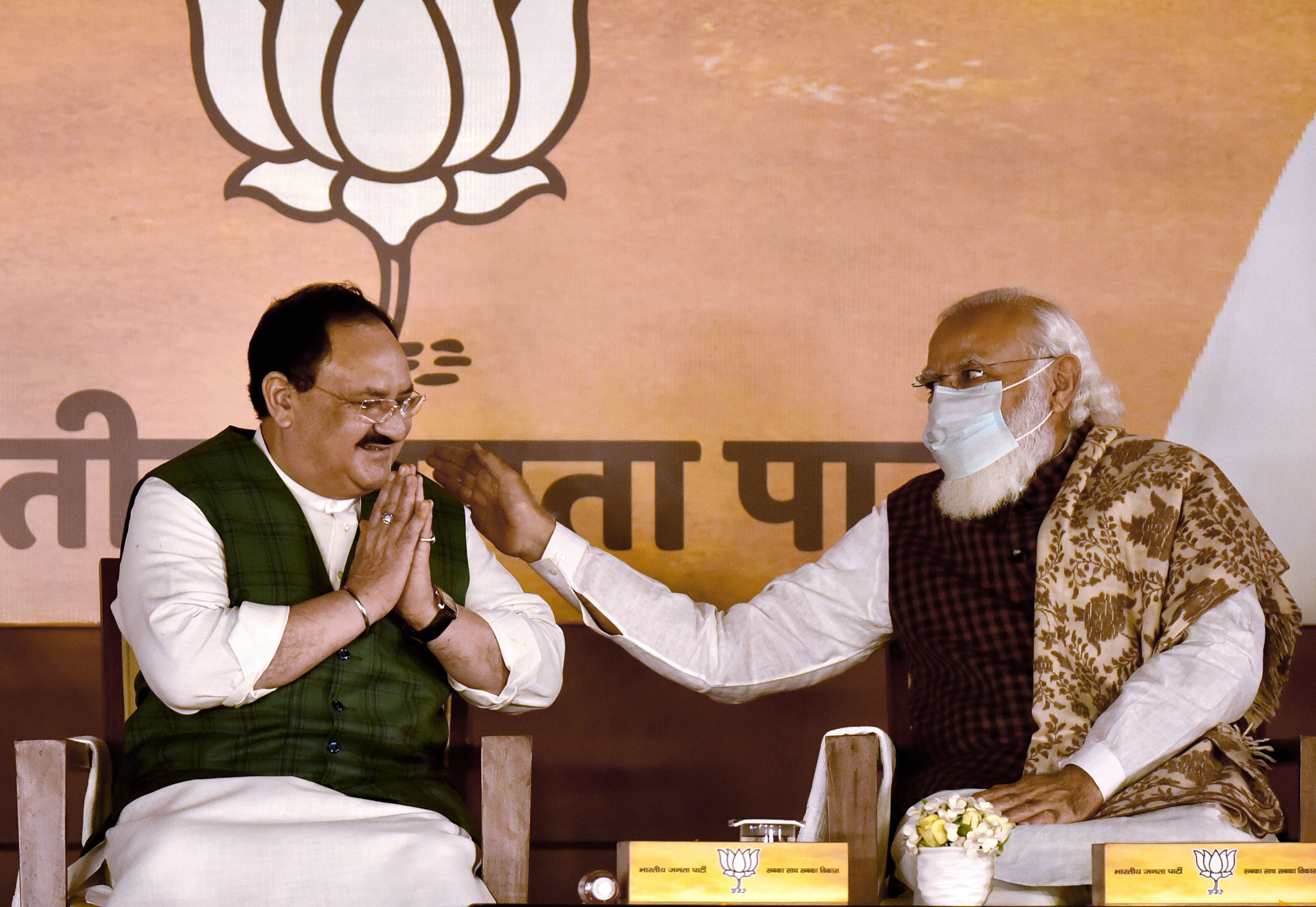Narendra Modi emphasises supremacy of party worker and organisation, sans family dominance, in his hour of triumph.
Addressing a victory celebration at the BJP national headquarters on Wednesday, Narendra Modi was unequivocal in pointing out how the Bihar election this year was different from the past. Poll violence and booth capturing used to dominate the discourse earlier. In 2020, the focus was on close contests and in spite of the Covid pandemic the turnout of voters was impressive (in the third phase of polling it was marginally higher than the figures of 2015). Modi also pointed out that it was not Bihar alone where his party had done well—results of the 59 bypolls held in various parts of the country had also brought cheer. Indeed, having won 41 of these 59 seats, BJP had cause to celebrate. Of these 41 wins, 31 had been at the cost of Indian National Congress, which had won these seats initially.
Though Modi did not quote his deceased friend Arun Jaitley, the spokesmen of his party recalled Jaitley’s statement in May 2019, a few months before he passed away, when he lamented that “The Grand Old Party of Indian politics has now become a fringe outfit”. Congress performance in Bihar and its drubbing in the bypolls in most parts of the country with the exception of Haryana and Chhattisgarh, showed that Jaitley was not off the mark.
Modi spent some time of his victory valediction in referring to how a national party like Congress had become a family outfit. With a majority of MLAs who had crossed over with Jyotiraditya Scindia having been re-elected, the message was loud and clear—there is opportunity for political workers to rise sans family connections in the BJP. The victory dais has three former BJP presidents—Amit Shah, Nitin Gadkari and Rajnath Singh, flanking party chief J.P. Nadda and to drive home the point that BJP was an organisation-centric party as against individual-centric outfits, Modi asked party workers to join him in raising a slogan: “J.P. Nadda tum aage barho, hum tumhare saath hain”. Sharing his glory with the party organisation, Modi was driving home the point once emphasised by L.K. Advani, that BJP was a party with a difference.
Till the 1969 split in Congress, which saw Indira Gandhi’s persona emerge as the focal point, Congress presidents used to be accorded high dignity. A few years later, the then Congress president, D.K. Barooah, went on to declare “India is Indira; Indira is India”. Modi’s reference to parivar in the context of Congress and other regional parties and his rooting for J.P. Nadda’s leadership had a far reaching message.
Bihar was the only Hindi heartland state where BJP had not plateaued. Though it won one seat less than the Tejashwi-Yadav led RJD, its 2020 performance makes it come out of the shadows of being a junior partner in a major state. The magnanimity shown by the party’s leadership by standing by its commitment that Nitish Kumar shall be the Chief Ministerial face shows BJP’s commitment to “coalition dharma”, a term first heard since NDA politics kicked off in May 1998. Keeping the NDA together will be a tough task in Bihar—eight seats are held by two smaller allies, HAM and VIP, who had quit Mahagathbandhan to join NDA on the eve of elections.
The margin of victory in Bihar has been narrow. The tally of the Tejashwi-led Mahagathbandhan was 0.03% less than that of NDA. It goes to Tejashwi’s credit that he could emerge as a formidable challenger on the eve of his 31st birthday. More than Nitish Kumar’s record as CM it was Brand Modi and the success of the Direct Benefit Transfer and schemes like PMGKY, Ujjwala, etc., which benefitted the NDA, which enjoyed the silent support of women and EBC voters, who were not swayed by the high decibel Mahagathbandhan campaign.
Jawaharlal Nehru was not a brand, though the question, “After Nehru, who?” was not answered in his lifetime. Indira Gandhi emerged as a brand. And so has Narendra Modi. The Indira brand withered after her as Congress did not develop an apparatus to take it forward. That is perhaps the reason why Modi has chosen to raise the slogan “J.P. Nadda age barho, hum tumhare saath hain”. Supremacy of the party and not of an individual has thus been underscored by Modi in his hour of triumph.
Tailpiece: Bhoopendra Hooda in Haryana and Bhupesh Baghel in Chhatisgarh, true to their respective names, proved to be “zammeni” (close to earth) leaders within Congress by ensuring bypoll wins. Though he lost out, Madhya Pradesh’s Kamal Nath showed magnanimity by driving to BJP Chief Minister Shivraj Chouhan’s home with a bouquet. Tipped off by intelligence, the CM too kept a bouquet ready and as Kamal Nath stepped out of his car, the first bouquet was presented by Chouhan. In his Vijayadashami speech, RSS chief Mohan Bhagwat has said politicians’ relationship has to be of “spardha” (competition) and not enmity. Chouhan and Nath’s behaviour was an example of “spardha”.

